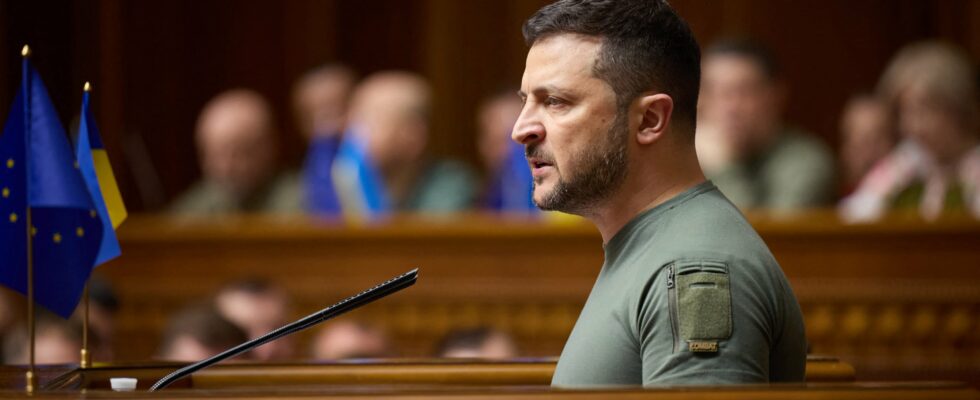In times of war, is it easier to lead a dictatorship or a democracy? Volodymyr Zelensky certainly has his own ideas on the matter. After almost three years of total war, the Ukrainian president must deal with critical public opinion and an opposition which does him no favors, even accusing him of authoritarianism. “At some point, we will no longer be different from Russia, where everything depends on the whims of one man,” Vitali Klitschko, the mayor of kyiv, declared last year.
If experts agree that Ukraine remains very far from an authoritarian country, the war has undeniably led to a concentration of powers around the president and his powerful and controversial head of administration, Andriy Yermak. No elections – presidential or legislative – have been able to be held since the start of the conflict, due to martial law. In September, Volodymyr Zelensky announced a surprise reshuffle, with nine new ministers, a way of injecting, according to him, “new energy” into the executive. A way, above all, to close ranks around him. Foreign Minister Dmytro Kouleba paid the price. Deemed too autonomous, he was replaced by Andrii Sybiha, a former diplomat close to the head of the presidential administration Andriy Yermak, who oversees – unofficially – the country’s foreign policy.
Guardrails
As soon as the popular general Valeri Zalouzhny is ousted in February 2024, the president suggests that a reshuffle is in the cards. However, it took several months of negotiations before achieving this. “To replace a minister, you need a majority in Parliament,” explains Oleksandr Salizhenko, analyst for the Chesno organization. “That of Volodymyr Zelensky remains fragile.” At the Rada, new appointments are subject to several votes, due to lack of agreement. “Parliament has resumed its control function,” concludes the political scientist. A sign of this change, the plenaries open to the press have resumed, with questions to the government, a format which has not existed since February 2022.
Far from a recording chamber, the Assembly remains a place of dialogue, capable of imposing safeguards. “Parliament, for example, took the responsibility of speaking publicly about the problems of mobilization and giving it a normative framework,” continues Oleksandr Salizhenko. For months, MPs debated it, despite criticism from the military command which is desperate to fill the ranks and replace exhausted, injured or dead soldiers. “In democracies, decision-making takes much longer, but I think we have found a certain balance, defends MP Halyna Yanchenko, engaged in the fight against corruption. In Ukraine, the authorities cannot do anything without a consensus of society. The president is aware of this. He is also very sensitive to public opinion.
Mobilization, ultimate taboo
There is no question of clashing, which explains, according to former Ukrainian officer Evhen Dykyi, the taboo surrounding mobilization. “Our civilian government avoids this subject, which is not popular,” he squeaks. “But it is Zelensky’s prerogative, as supreme commander, which places the army today in a very difficult.” While Russia is progressing in the east of the country, not enough young Ukrainians are getting involved. Those who do are often older and poorly trained. “The army needs more people, it would like to mobilize younger people but the role of Parliament is to serve as a filter on what is acceptable or not for society,” believes Halyna Yanchenko.
For their part, the media and civil society continue to form a real counter-power. Journalists publish disturbing articles – particularly on corruption – which lead to investigations and convictions. Last week, Volodymyr Zelensky also organized two meetings with journalists and representatives of civil society to explain his “victory plan”, which some consider too dependent on foreign aid. The president promised an “internal plan” for what Ukraine should do. “In Russia, everything is much simpler, because only one person makes the decisions,” concludes Halyna Yanchenko. “But here, democracy is part of our DNA. We cannot do otherwise.”
.
